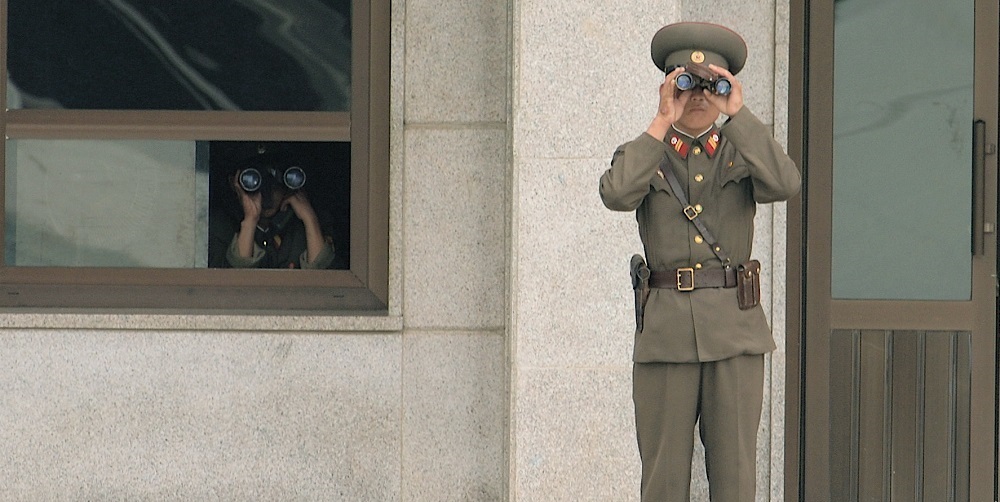The Peninsula
North Korea Blinks

By Mark Tokola
No one apart from the representatives of the North Korean and South Korean governments who took part in the marathon talks over the weekend of August 22 can know exactly what took place. But there is some inevitable spin regarding who came away the “winner.” North Korea says that it forced South Korea to end the loudspeaker broadcasts at the DMZ. South Korea points to North Korea’s expression of regret at the wounding of two ROK soldiers from landmines. Until more details become available – which may take a long time – the most reasonable conclusion from an outside perspective is that North Korea blinked, and that is a good thing.
The essential story is that two ROK soldiers were wounded by landmine explosions at the DMZ in an area that the ROK Army routinely patrols. South Korea demanded that North Korea acknowledge responsibility for planting the mines and apologize. North Korea refused. South Korea took the next step of resuming, after a long silence, loudspeaker broadcasts aimed at DPRK soldiers stationed at the DMZ. North Korea threatened war, imposed a deadline, and began moving military forces. Incidentally, North Korea attempted to counter with its own loudspeaker propaganda but because of technical inferiority, their broadcasts were too garbled to be intelligible. At this point, casual watchers of international news may well have concluded that the dangers of war far outweighed the value of the South Korean loudspeaker broadcasts and that South Korea should back down to preserve peace. Park Geun-hye’s Administration, however, held its nerve and reiterated its demand for an apology. The two sides agreed to talks that extended beyond North Korea’s deadline and, in the end, North Korea did release the statement of regret that South Korea initially demanded. South Korea then ended its loudspeaker broadcasts. In addition, the two sides have agreed to a renewed working-level dialog on family reunions, and announced that they would hold further talks aimed at improving North-South relations.
Was all this what North Korea intended? Probably not. The landmine incident most likely was a misjudgment by the North Korea Army, trying to act a little aggressively to protest the long planned joint ROK-U.S. military exercises, but without intending to trigger a crisis. In the face of the ROK’s demand for an apology, North Korea fell back on its traditional bluster and saber-rattling, probably assuming that the ROK would back down and seek a face-saving gesture. When that did not happen, North Korea had no next step, and had no alternative other than to enter into talks and, in the end, issue the apology. The language of the statement of regret is qualified, but it is still a statement of something other than defiance.
If war does break out on the peninsula, it almost certainly will come about as the result of an accident and events spiraling out of control. The North Korean regime is well aware that war probably would result in great harm to the Republic of Korea, but certainly would mark the end of the Kim family regime in the North. The North Korean regime is brutal and dangerous, but not suicidal.
One indicator of South Korea’s resolve to not give in to North Korea bluster and threats took the form of their chief negotiator at the August 22-23 talks. Park Geun-hye’s representative was Chief of the National Security Office Kim Kwan-jin. Kim was previously the Chief Director of Joint Operations Headquarters on the ROK Joint Chiefs of Staff, and then the four-star commander of the Third ROK Army. Following the 2010 North Korean shelling of Yeonpyeong Island, which resulted in civilian deaths, then-President Lee Myung-bak appointed Kim Kwan-jin as the new ROK Defense Minister, sending a clear signal that any further provocations from the North would be met with force. When Park Geun-hye became President, she retained Kim Kwan-jin as her Defense Minister and in 2014 moved him to become her National Security Office Chief. Therefore, when Hwang Pyong-so, a member of Kim Jong-un’s inner circle and the North Korean Army’s political director, sat down to negotiate with Park Geun-hye’s representative, he knew he was facing someone who understood the strategic balance of forces and the military options available to both sides.
Has a new opening been created for productive talks between North and South Korea? We can hope so, but the fact that the recent flare-up in tensions probably was not planned or intended by North Korea introduces an element of pessimism on that point. The key question regarding when productive inter-Korean talks might begin is whether the Kim Jong-un regime is stable and self-confident enough to deal. On that question, the jury is still out. One glimmer of hope is that when the North Korean government described the August 22-23 talks, they said they were being conducted with the “Republic of Korea,” rather than using one of their usual epithets such as the “puppet regime.” The DPRK usually chooses its words with intent.
Mark Tokola is the Vice President of the Korea Economic Institute of America. The views expressed here are his own.
Photo from imcomkorea’s photostream on flickr Creative Commons.
